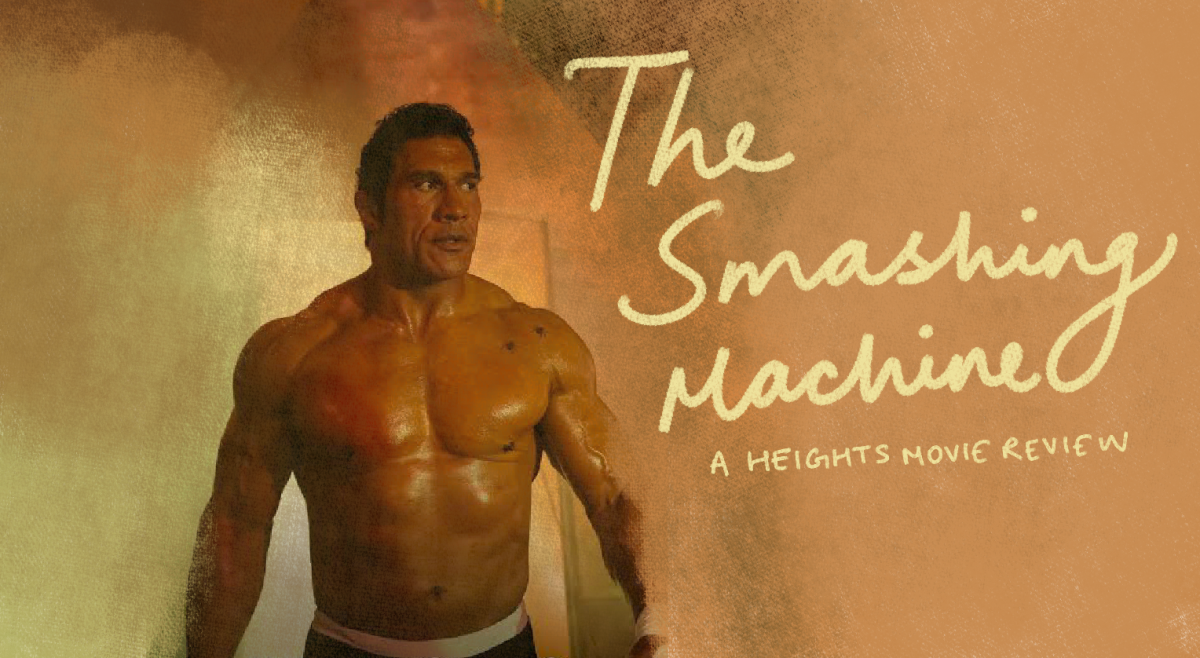★★★★☆
The Smashing Machine is not your typical Dwayne Johnson blockbuster. Known for his larger-than-life action roles, Johnson steps into something far more grounded in this gritty biopic about UFC legend Mark Kerr. The film trades spectacle for sincerity, offering an unflinching look at fame, addiction, and the cost of greatness.
Based on a true story from the late ’90s, the film follows Mark Kerr (Johnson), one of the UFC’s pioneers. Long before the sport reached mainstream fame, Kerr was among its biggest stars—a dominant wrestler who had never known defeat. The film opens with Kerr at the height of his career, but his devotion to the sport soon collides with the fragility of his personal life. His relationship with girlfriend Dawn Staples (Emily Blunt) is strained by his relentless training schedule and deepening opioid addiction.
As Kerr’s dominance in the ring starts to waver, the film shifts its focus to the emotional toll of his double life as he tries to hold it all together. His struggle with addiction becomes a central thread, revealing both the physical and psychological toll of a life defined by performance.
The tension reaches its peak when a group of elite UFC fighters competes in a high-stakes Japanese tournament, putting Kerr’s endurance and pride to the test.
All that said, Johnson’s performance is what makes the film an engaging watch. At first glance, it might seem like another crowd-pleasing sports drama in the vein of Rocky or Creed, but, much like Southpaw, it dives deeper into the grit and emotional toll its characters face. Both Johnson and Blunt deliver powerful performances. The toxicity of their relationship is portrayed with such raw emotion that it adds a gripping layer of tension to the film.
When the focus shifts to the ring, Johnson’s work becomes even more impressive. Even amid the brutal matches, the vulnerability of the man outside the cage continues to shine through. It’s clear that Johnson fully embodied his role. The fight scenes are both thrilling and realistic—every hit feels genuine, and the sharp sound design allows that intensity to resonate with the audience.
While viewers naturally root for Kerr to win, his losses make those victories all the more meaningful. In that way, The Smashing Machine becomes not only a story of Kerr’s resilience, but also a defining performance for Johnson himself.
The film’s score and soundtrack are equally remarkable, layering serene instrumentals over moments of sheer brutality. The calm of the music, especially before major fights, draws the audience into the mindset of the fighters as they attempt to steady themselves before chaos erupts. It also mirrors Kerr’s dual nature: a powerhouse in the ring, yet measured and composed when outside it.
The Smashing Machine manages to be both entertaining and emotionally resonant. Its action sequences deliver all the adrenaline you’d expect, yet the film never shies away from exploring deeper themes of addiction, love, and loss. It’s a role Johnson executes with striking nuance, and though it comes late in his career, it reveals a range and vulnerability that audiences haven’t seen from him in years.







